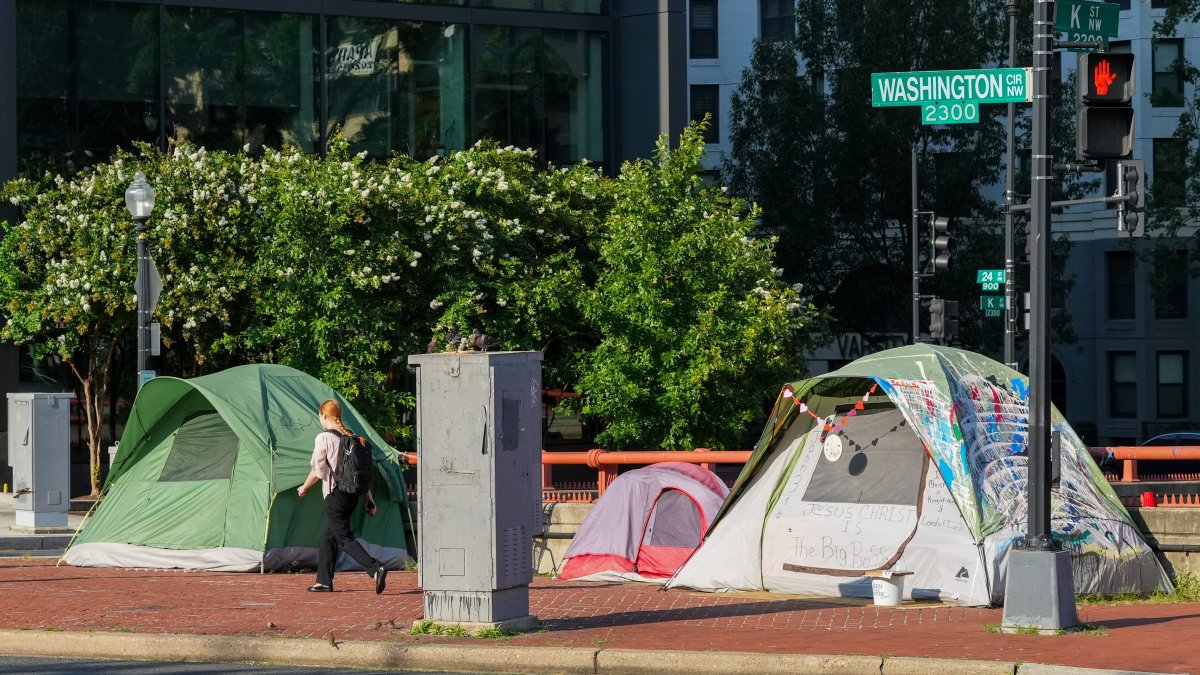Should Displaced D.C. Homeless People Seek Shelters, Treatment, or Jail?

Understanding the Recent Actions on Homelessness in Washington, D.C.
Over the past weekend, President Donald Trump made headlines by urging homeless individuals in Washington, D.C., to vacate the area "IMMEDIATELY." He emphasized that the federal government would provide alternative housing options that would be "FAR" from the nation's capital. This initiative has sparked a range of reactions from local officials, advocates for the homeless, and the general public. The president's announcement came alongside a series of measures aimed at federalizing the Metropolitan Police Department and deploying the National Guard to remove homeless encampments from public parks.
The Rationale Behind the Initiative
President Trump’s reasoning for these drastic measures is rooted in his desire to tackle crime and improve the overall condition of the nation's capital. He stated that Washington is plagued by "crime, bloodshed, bedlam, and squalor," and aimed to "rescue" the city from these issues. The administration's approach has raised questions about the true effectiveness of such measures, especially in dealing with the complex issue of homelessness.
Federalizing the Police and Deploying the National Guard
In conjunction with his remarks about homelessness, Trump announced that he would be federalizing the Metropolitan Police Department. This decision is intended to enhance law enforcement's capacity to address crime in the city. Furthermore, the deployment of the National Guard signifies a severe escalation in response measures, which many have criticized as excessive. The administration's intent to clear homeless encampments was framed as a necessary action to create a safer, cleaner environment.
Implementation of New Policies
In the aftermath of Trump’s announcement, White House Press Secretary Karoline Leavitt provided further clarification on the intended policies. She indicated that the Metropolitan Police Department and U.S. Park Police would start enforcing "pre-existing laws" to clear homeless encampments from federal properties. Individuals residing in these encampments would face options: they could accept relocation to shelters or services aimed at addressing addiction and mental health, or risk fines and jail time if they refused.
Concerns from Advocates and Local Officials
Advocates for the homeless in Washington have expressed skepticism regarding the proposed solutions. Andy Wassenich, policy director for Miriam’s Kitchen, voiced his confusion over the lack of clarity surrounding the offered services. Questions about the logistics of relocation, the funding for mental health services, and the adequacy of current resources have been raised. Wassenich highlighted the reality that many individuals experiencing homelessness may not have access to the necessary support systems, leaving them with few viable options.
The Current State of Homelessness in Washington, D.C.
The issue of homelessness is not new to Washington, D.C. According to the Department of Housing and Urban Development, homelessness rates have surged in recent years, with 5,616 homeless individuals recorded in 2024, an increase from 4,922 in 2023. While many of these individuals utilize emergency shelters, nearly 800 remain unsheltered on any given night. The city has made strides in providing shelter, with over 1,100 beds available for single adults, but the demand for services continues to outpace supply.
Services Provided to the Homeless Community
Washington's Deputy Mayor for Health and Human Services, Wayne Turnage, stated that the city offers shelter space for anyone willing to come inside. However, the concern remains that not all individuals experiencing homelessness can or want to access these services. The mayor’s office emphasizes the need for stable, independent housing solutions, claiming that their goal is to make homelessness "brief, rare, and non-reoccurring."
Legal and Ethical Implications
The legal aspects of the enforcement measures have also come under scrutiny. Advocates for the homeless argue that the administration's approach may infringe on the rights of individuals who are already vulnerable. The suggestion that individuals could face jail time for refusing services raises ethical questions about the treatment of marginalized populations. Local officials have indicated that existing procedures allow for coordination with federal authorities to clear encampments, but the process must be handled with care and compassion.
The Role of Community Organizations
Community organizations play a vital role in supporting homeless individuals by providing not only shelter but also access to essential services such as mental health care and addiction treatment. These organizations often serve as the first line of defense for individuals in need, offering resources that may not be available through government programs. Many advocates argue that a collaborative approach between local government and community organizations is crucial to effectively addressing homelessness.
Potential Outcomes of the Current Approach
As the administration moves forward with its plans, the potential outcomes remain uncertain. Some critics argue that merely relocating homeless individuals does not address the root causes of homelessness, such as poverty, mental illness, and lack of affordable housing. The cycle of moving encampments from one location to another has been likened to a game of "whack-a-mole," where the underlying issues remain unaddressed, and individuals continue to face the same challenges regardless of location.
Responses from Local Government
Mayor Muriel Bowser has publicly stated that she had not been briefed on the specifics of the federal plan but would be seeking further information from federal officials. The D.C. government maintains that its objective is to provide stable housing and reduce the number of individuals experiencing homelessness. However, the effectiveness of the federal government’s approach remains to be seen, especially as local officials strive to balance the enforcement of laws with the need for compassion and support.
Understanding the Broader Context of Homelessness
Homelessness is a multifaceted issue that extends beyond the boundaries of Washington, D.C. Various factors contribute to the rising rates of homelessness across the United States, including economic instability, housing shortages, and inadequate access to mental health care. Addressing this crisis requires a comprehensive strategy that not only provides immediate relief but also fosters long-term solutions aimed at prevention.
Looking Ahead: Strategies for Change
Moving forward, it is essential for policymakers at all levels to engage in meaningful dialogue with stakeholders and community organizations. Strategies aimed at prevention, affordable housing development, and enhanced mental health services are critical for creating sustainable solutions. A holistic approach that addresses the root causes of homelessness, along with immediate support for those in need, is necessary to create a more equitable society.
Conclusion
The current actions taken by the federal government in Washington, D.C., to address homelessness reflect a complex interplay of social, legal, and ethical challenges. As officials grapple with how best to support vulnerable populations, the emphasis must remain on developing comprehensive strategies that prioritize the well-being and dignity of all individuals. The outcomes of these initiatives will likely set a precedent for how homelessness is addressed in urban areas across the country.
FAQs About Homelessness Initiatives in Washington, D.C.
What are the primary reasons for the rise in homelessness in Washington, D.C.?
The rise in homelessness can be attributed to several factors, including economic instability, lack of affordable housing, and inadequate mental health services.
What options are available for individuals experiencing homelessness in Washington, D.C.?
Individuals can access emergency shelters, mental health services, and addiction treatment programs, as well as be offered relocation options if they are living in encampments.
How is the federal government involved in addressing homelessness?
The federal government has taken steps to federalize local police departments and deploy the National Guard to enforce laws aimed at clearing homeless encampments, while also proposing services to support homeless individuals.
As Washington, D.C., navigates this complex issue, it raises an important question: How can we balance the need for public safety with compassion and support for vulnerable populations? #Homelessness #PublicPolicy #SocialJustice
```Published: 2025-08-13 01:13:37 | Category: Trump GNEWS Search



